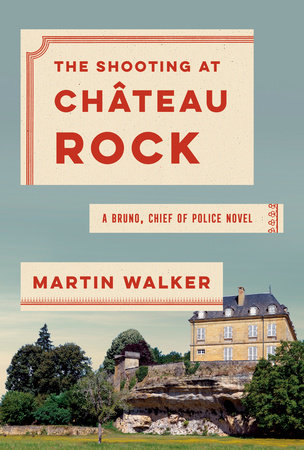. . . . Thanks to the opening of the library branch's Grab 'n Go program, I have received the very last published volume in Martin Walker's Bruno Chief of Police series, published in May (2020), #18, The Shooting at Château Rock. Chief Bruno and the fluctuating cast of St. Denis and the Périgord region have been an ongoing part of my life since the later part of June. There's no gift more desirable to reader, than the discovery of a multi-volume series in which all the titles have already been published.
I wonder if there will be any more Chief Brunos. I can see Walker successfully creating more titles in the series set plausibly in the covid-19 era. his might not be the case for every series going by any means, particularly one with as many titles and regular, established characters and relationships. In this series though, it’s not as if Europe, France and this region of France haven’t suffered dreadfully in pandemics in the past.

One of Chief Bruno's French Basset boys typical positions, requesting tummy rubs from humans they like -- especially women. Supposedly this is the breed from which George Washington received his own pack of hunting hounds from Europe. Like the varieties of wine that pour through the Bruno novels, so dogs, horses, cows, sheep chickens, geese, donkeys, even snakes.
Bruno's Balzac, his second basset, at two years, should now begin his duty to continue the breed, something only Martin Walker would have thought of as part of a police tale's story? Particularly as it seems French Basset males can need some human help in getting 'er done, particularly the first time. (Which to my mind never bodes well for the endurance of a breed of anything when it needs humans to have sex.)
An earlier post brings up the large place in these books taken by agriculture at large, wine making and drinking, and the raising, cooking and eating of food in convivial circumstances. just the châteaux of the the Loire Valley have very long been the fantasy ideal of fairy tale castles, Walker’s St. Denis of the Dordogne is a French fairyland world, in which a community retains traditional cultural ways practiced
for centuries, where all its vastly long history exists on top, around and through the present, where so much daily life is good (not to mention delicious), a world that is carefully cared for and nourished by its officialdom top down, from mayor and wealthy residents, to, above all, its Chief of Police, who operates almost like St. Denis’s personal guardian angel. Even so, very bad things happen there.
The region is always in flux. In past it suffered invasions since at least the days of the Phoenicians; these days it suffers -- and prospers -- by floods of outsiders, whether summer residents from England who come to stay, tourists from the entire world or day trippers from Paris. From this flood emerge an endless procession of bad guys, whether as legacy from France's colonial evils, its Nazi occupation, or new ones that have blossomed on their own, such as the Russian oligarchs. Yet, there's always a purely local connection that brings them to Bruno's St. Denis, as befits the pull of the region human beings have inhabited continuously longer than anywhere else in Europe -- and before them, and co-habiting with Neanderthals too. Whether newly discovered Neanderthal grave sites, the Caves of Lascaux, to what is embedded in the thousands of years of eating and drinking, this is as much a cradle of civilization as Mesopotamia or the Ganges.
The EU almost functions as the highway for the very bad things' presence. I like so much that the EU is a constant reference in the book. Its rules, regulations, trade agreements. and evidently its power, at least as regarded by the residents of a rural community, is in the way of them making a living. It is almost always outsiders that are the actors for the bad events.
The series may not be the best writing or even the best series, perhaps? but it was reliably engaging, and unpredictably quirky through out. The quirks are what makes its formula feel awake, not tired. Original, yet formulaic enough, new books could trace pathways within the pandemic as it was / is happening in France, to deepen the community's relationships, official and personal, and provide new interests and development in the characters. This isn't literature, but it is terrific story telling, keeping us coming back for more, always wanting to know more. The reader quite becomes part of the community. If we are fortunate enough to enter into such a community, becomes a part of it, so we are always interested in our friends and neighbors of St. Denis. That's quite a lot of accomplishment -- the author should be pleased and proud.


No comments:
Post a Comment